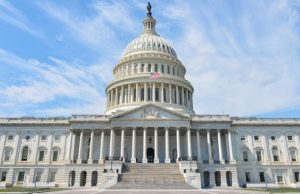When It Pours, Rainy Day Funds Help – A Little

Congressional Budget Office – via LinkedIn
Both the United States and the United Kingdom have joined the increasingly crowded ranks of countries sustaining a debt load equal to, or greater than, their national income. The US Congressional Budget Office has warned that over the next decade, the fiscal deficit will rise to 5.4 percent, more than triple its historic average of 1.5 percent.
In the UK, the national debt ballooned from 74.5 percent in 2010, when the Conservative Party reclaimed No. 10, to 84.7 percent in March, at the end of the 2019-20 fiscal year and just before the pandemic clamped down on economic growth. A full decade of modest, yet consistent, economic growth was wasted as the Conservatives – again – failed to live up to their reputation for fiscal rectitude.
Elsewhere in Europe, governments – including those corralled into the much maligned ‘Club Med’ – managed to turn deficits into surpluses and pay down debts. At the end of last year, the debt-to-GDP ratio of European Union averaged out at 79.3 percent with 16 of its (then) 28 member states meeting the Maastricht Treaty criteria that impose, amongst others, a debt ceiling of 60 percent. The same applies to pre-pandemic fiscal accounts with 15 EU member states and all four associated EFTA members registering a surplus.
The well-travelled traditional paths to deficit and debt reduction – economic growth, spending cuts, and printing money – are presently cut off and likely to remain so for the next two years or so. Even though these escape routes are blocked, both the International Monetary Fund (IMF) and World Bank have been clamouring for the immediate opening of fiscal spigots to keep corona-hit economies on life support, ready to snap back to growth once the emergency is over.
However, the monetary toolboxes of the US Federal Reserve, the Bank of England (BoE), and the European Central Bank (ECB) have largely been depleted. No matter how much freshly-minted cash is thrown at economies, most refuse to show any sign of inflation – a sure-fire precursor to, and engine of, growth when applied in moderation.
Not Now
World Bank Chief Economist Carmen Reinhart in early October urged countries to fill their war chest with new debt to fight the pandemic. A former Harvard professor who researched the economic impact of financial crises with economist and chess grandmaster Kenneth Rogoff, also of Harvard, Reinhart argues that during a war, costs are largely irrelevant: “You figure out how to pay for it afterwards.”
Reinhart recognises that emerging market economies have a lower tolerance for debt than advanced ones and predicts a major debt crisis once the pandemic has run its course: “The pandemic and its economic impact present a crisis with no historic precedent. We are at levels not seen since the 1930s. This is why we need to talk about debt write-offs.”
Reinhart worries about the opacity of the global debt markets which tabulates mostly bond issuances but largely ignores bilateral lending which often involves contracts with non-disclosure clauses: “As a consequence, the private debt market and multilateral lenders are working on the assumption that debts are lower [than they really are].”
Emerging economies depending on outside financing have seen conditions worsen considerably over the past few months as investors departed and capital flows reversed, hampering central banks whilst they try to keep loose monetary policies in place as part of their response to the pandemic. The central banks of Hungary and Turkey have started to raise interest rates as the forint and lira came under pressure. Brazil, South Africa, and Russia also suffered a sharp devaluation of their currency which signals a tightening of financial conditions and a possible future cash crunch.
Raising Debt
According to numbers compiled by the Institute of International Finance (IIF), emerging market countries have raised $145 billion on bond markets since the start of the year in addition to another $630 billion raised domestically. These countries benefitted from the trillions in liquidity provided by the Fed, ECB, and other central banks, and from the emergency credit facilities set up by the IMF and World Bank.
Due to the relatively short maturities of most new bonds issued by EM countries, a debt crisis seems all but inevitable. IMF Deputy Director of Strategy, Policy, and Review Jeronim Zettelmeyer warns that the number of countries at high risk of a financial crisis has increased dramatically: From 3 to 8 for advanced economies, and from 15 to 35 for emerging markets. According to Zettelmeyer, a few countries have already lost access to bond markets and may be in trouble.
These early indicators of trouble ahead didn’t stop IMF Managing Director Kristalina Georgieva from repeating Fyodor Dostoyevsky’s advice, dispensed in Crime and Punishment: Only one thing matters – to be able to dare. On a side note: the novel’s protagonist Raskolnikov, wrecked by guilt, ultimately confesses and is sentenced to eight years of penal servitude in Siberia. There are, perhaps, too many parallels for comfort as memories of ‘lost decades’ resurface.
Europe
Almost as soon as the pandemic’s scope became clear, the European Union unceremoniously ditched the financial constraints to which the nineteen eurozone member states were subjected. Almost sheepishly, Brussels followed Germany’s cue after Berlin scrapped its ‘schwarze null’ policy which outlawed deficit spending. Europe’s ‘frugals’ almost immediately flexed their financial muscle and embraced a ‘whatever-it-takes’ philosophy to weather the storm. The display of shock-and-awe financial fiscal firepower is expected to tack an average of 15 percentage points to the ‘frugals’’ debt-to-GDP ratio. That said, not a single one of the EU’s six Triple A member states is expected to lose its prized top rating.
The UK is, however, a different story as the country not only battles the pandemic but must also face the imminent end of the Brexit transition period during which it maintained unfettered access to the EU’s single market. If a trade deal is forthcoming, it is expected to be a skeleton agreement to which ‘opt-ins’ may be attached over the months and years ahead – undoubtedly involving tortuous and possibly acrimonious negotiations.
Without much in the way of financial buffers or wriggle room built up when times were still good, Chancellor of the Exchequer Rishi Sunak is exploring the edges of the possible, including a possible tax hike to be unveiled in his November budget.
With the Treasury leaking like a sieve, both literally and figuratively, a series of instantly controversial proposals have emerged, including a cut in pension tax relief and increases in capital gains and corporation taxes. The latter, it is whispered, could go up from 19 percent to as much as 24 percent. The rate adjustments seek to raise an extra £20 billion for the fight against covid-19. Meanwhile, the Office of National Statistics (ONS) revealed that the UK national debt broached the £2-trillion mark for the first time ever and will soon equal the country’s annual economic output.
Over in the EU, all eyes are trained on the rather dismal performance of the price index which continues to slump into deflationary territory. Earlier this week, ECB President Christine Lagarde announced that the eurozone suffered its third consecutive month of deflation. ECB policymakers are concerned that the eurozone may emulate Japan with a scenario of negative interest rates, sub-zero inflation, and weak growth.
The silver lining to this gloomy picture was provided by the surprisingly strong economic bounce back – almost 10 percent – registered over the third quarter. However, 2020’s final quarter promises to disappoint as most EU member states were forced to reimpose restrictions, ranging from symbolic to draconian, and order the closure of public venues in response to the pandemic’s equally forceful bounce back. Given the darkening outlook, Lagarde is likely to intervene in early December with yet another stimulus package – hoping, if not expecting, a different outcome.
You may have an interest in also reading…
Business in Times of Corona: The Lure of Rustbelts When Lean Is No Longer Mean
During their short lifetime, shrimp barely migrate. Aided by a snap of their tail and the tidal currents, the crustaceans
Hard-Hit but Striking Back: Dubai Finds Correct Balance
Last year, Dubai registered a sharp decline in its population. Almost eight of every 100 inhabitants left the country as
Business in Times of Corona: World Bank and IMF Ready to Assist Low- and Middle-Income Countries
As concerns grow over the impact of the pandemic on less resilient economies, multilaterals such as the World Bank Group
















































































